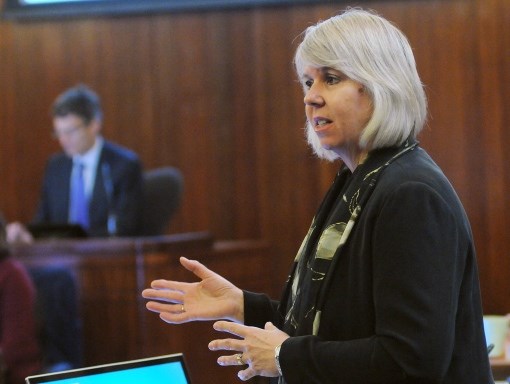A Vancouver city councillor is proposing that future candidates for council, park board and school board pay an additional $50 to run in an election and collect quadruple the number of signatures currently required on nomination documents.
Green Party Coun. Adriane Carr also wants the campaign period to extend from 29 days to 80 days to allow candidates to reach more residents in a city that saw only 39.4 per cent of eligible voters cast a ballot in 2018.
In addition, mayoral candidates should be required to get 200 nominators, she said. Current rules state candidates vying for all 27 civic seats pay a refundable deposit of $100 and must provide 25 signatures of nominators.
The $100 fee has been in place since 1999, and the requirement for 25 nominators came into effect in 2008. Previously, only two signatures were required.
Carr cited the long list of candidates in the 2018 election — a total of 158 for council, school board, park board and mayor — and the short campaign period as the main drivers in her motion to make changes before the next election in 2022.
Her motion goes before council next week.
“As our [post-election] survey showed, a lot of people were turned off by the really long list and it became a problem for them,” she said, referring to a recent staff report and accompanying Insights West survey of the election.
Asked how many of the 158 candidates she believed were serious about their intentions to become an elected official, Carr said it was a difficult question to answer.
“There were certainly candidates who I don’t think had an expectation of getting elected but wanted to use the election as a platform to raise issues, or to be out there for whatever reason,” said Carr, who didn’t name names.
“Certainly it was a problem at debates when they didn’t have answers to the questions one would expect any serious candidate to have during an election.”
Increasing the number of signatures and the cost to run may weed out less serious candidates, she said. An extended campaign period would also give voters more time to learn about candidates and the campaign issues, she added.
Carr said such a move could also better track so-called “dark money” collected but not disclosed by third party advertisers between campaign periods.
During an election, the city provides information to residents about candidates, which appear online and in a voters’ guide.
But the city staff report said the high number of candidates in the 2018 race may have been “overwhelming for voters to learn about each of the individual candidate’s platform, particularly given the short time frame between when the candidates running for office are confirmed and election day.”
In Toronto, the nomination period in that city’s 2018 election closed 87 days prior to election day, which was 51 days earlier than the City of Vancouver’s nomination period.
OneCity Coun. Christine Boyle said she was opposed to increasing the $100 fee to run. Boyle pointed out the fee is refundable to a candidate once all the necessary paperwork is completed before and after the election.
“I don’t think there is a reason to raise it, and I worry that it would be an unnecessary obstacle for candidates,” she said.
“I’d favour not raising the cost, but raising the number of signatures so that people take it seriously when they put their name forward.”
Boyle said 150 to 200 nominators would be reasonable for a council candidate. She noted it takes more than 40,000 votes to get elected to council, so 200 signatures shouldn’t be a barrier for serious candidates.
“It’s a big city in an at-large system and I think the skills and the practice of being able to go out and talk to people and gain their support are important if you want to run for any of these positions,” she said.
Boyle said she wanted to do more research about extending the campaign period before stating her position.
Sarah Blyth, executive director of the Overdose Prevention Society, ran as an independent council candidate in the 2018 election. She didn’t win a seat but finished 19th, the highest of any independent in the council race.
Blyth said extending the campaign period for independents wouldn’t necessarily have a positive effect because a nomination meeting is not required to launch a run for office.
Although a candidate’s $100 deposit is refundable, Blyth said raising another $50 to run could be difficult for low-income candidates.
“People who already don’t have money, and making them pay more money, is just another barrier,” she said.
“The more people running, the better — even if they don’t necessarily have a chance of winning. It just improves democracy. You may not think they’re qualified, but they should be able to run very easily and get their word out.”
Added Blyth: “It may be more irritating for some people to have so many people running and at debates, but in some ways it increases the number of different people with different voices from different communities. I’m all for that.”
As for requiring more signatures on a nomination document, Blyth said: “Is 75 extra people going to make sure that the person is more serious?”
All of Carr’s proposed changes would require the provincial government to amend the Vancouver Charter.
Carr said she first wants the campaign period extension piece of her motion to go before the Union of B.C. Municipalities at its convention in September.
Asked whether she was confident the provincial government would agree to all the changes, Carr said: “I can’t say I’m confident, but I’m hopeful. First, obviously, is getting the support at UBCM, which would increase the chances greatly.”
B.C. Municipal Affairs Minister Selina Robinson said in an emailed statement to the Courier that “I welcome ideas and suggestions from local government officials to strengthen our democratic processes. Equity and access are important considerations in conversations about election rules.”
@Howellings



